

Leading the Post-Pandemic Workplace – Gallup. Psychological safety and leadership development. When employees feel comfortable asking for help, sharing suggestions informally, or challenging the status quo without fear of negative social consequences, organizations are more likely to innovate quickly, unlock the benefits of diversity, and adapt well to change—all capabilities that have only grown in importance during the COVID-19 crisis.
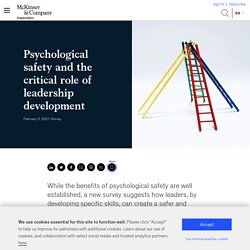
Yet a McKinsey Global Survey conducted during the pandemic confirms that only a handful of business leaders often demonstrate the positive behaviors that can instill this climate, termed psychological safety, in their workforce. Audio As considerable prior research shows, psychological safety is a precursor to adaptive, innovative performance—which is needed in today’s rapidly changing environment—at the individual, team, and organization levels. Fortunately, our newest research suggests how organizations can foster psychological safety. A recipe for leadership that promotes psychological safety The importance of developing leaders at all levels. The Employee Experience and a Great Workplace Culture - Gallup. Align Your Employee Experience With Purpose, Brand and Culture.
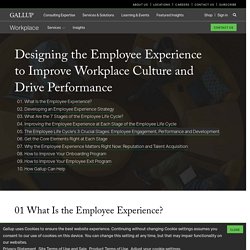
The employee life cycle and the experiences within it should be uniquely built to reflect your company purpose, workplace culture and employer branding. (What is the employee life cycle?) For example, if your organization promotes a customer-centric culture, how is that company culture experienced by employees in your hiring process and in your onboarding process? Where does it show up on an employee performance review? How might it be expressed in the way you say "goodbye" to employees who are moving on or retiring? Rituals play an important role in defining an organization's culture.
Building your employee experience should begin with a clear understanding of your organization's brand, purpose and the culture you want to create. Focus on the 7 Essential Stages of the Employee Life Cycle The employee life cycle identifies the seven major stages that employers need to get right within the employee experience. Understanding the Unconscious Relationship Between Leaders and Followers. Many elements of a healthy relationship are not explicit.
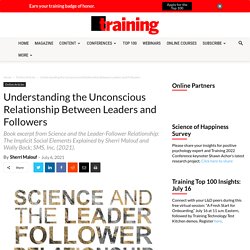
They cannot be verbalized as straightforward intentions or actions. Much of what we experience when we engage with others is unspoken or “implicit.” The implicit, while internal, can be read externally and therefore can impact the quality of our relationships. How can we identify and explain these implicit behaviors in ourselves and others? How do they affect our relationships? Self-awareness is a critical aspect of creating productive relationships. The fact that we are, for the most part, suppressing our selfish desires to be a part of a company, team, group, etc., is powerful. 7 icebreaker games to help your team build authentic connections - Work Life by Atlassian. 5-second summary Strong team cohesion – how bonded people feel to one another – is a key element for success in distributed teams.
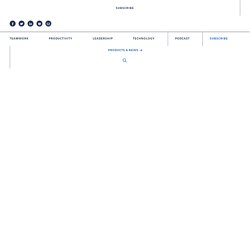
Icebreakers can be an effective way to help teams get to know each other and feel more comfortable collaborating.It’s important to choose the right icebreaker for your team. Teams that know each other well may be more comfortable sharing personal information. Newer teams may want to start with lower-stakes games that focus on work-specific topics. “Icebreakers.” “Icebreakers, particularly within the remote workspace, are an incredibly good idea,” says Eugene Chung, an Atlassian team coach and advisor on Team Playbook. That last point is crucial, particularly when the activity precedes a problem-solving or brainstorming meeting. The trick – as any hungry polar bear would tell you – is to break the ice in the correct fashion. 9 leadership principles and the psychology behind them - Work Life by Atlassian. 5-second summary Some people are born leaders in the sense that they instinctively know how to rally others to their side.
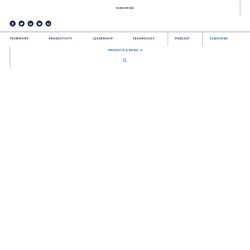
Others are born into leadership positions and fail miserably because they aren’t guided by principles that would make them effective. (Consider the disappearance of hereditary monarchies as a form of government, if you will.) The employee attrition spike is here - how to hang on to your best people - Work Life by Atlassian. 5-second summary Data from the U.S.
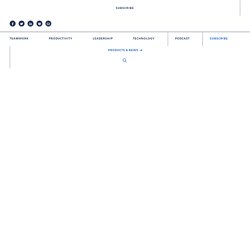
Bureau of Labor Statistics shows that we may be on the leading edge of an employee attrition spike among white-collar workers. Exit interviews can reveal valuable information about how people feel about their jobs. However, at that point, it’s too late to make the changes that might have mattered. Help employees improve well-being and performance - Gallup. We've identified seven catalysts that employers can use to support and change their employees' wellbeing behaviors.
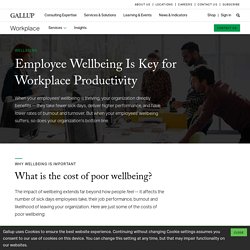
Each of the seven catalysts can be used to address and better support employees across the five elements of wellbeing. Development: Do your development plans include wellbeing goals? Recognition: Do you share and celebrate wellbeing successes? Take the Boss to Coach Learning Journey - Gallup. Effective management v micro-management? Do you check up or check in? – Discovery in Action.
When touching base with those in your team – do you find you ‘check in’ or ‘check up’?
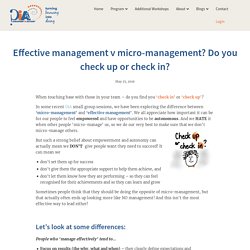
In some recent DiA small group sessions, we have been exploring the difference between ‘micro-management’ and ‘effective management’. We all appreciate how important it can be for our people to feel empowered and have opportunities to be autonomous. And we HATE it when other people ‘micro-manage’ us, so we do our very best to make sure that we don’t micro-manage others. But such a strong belief about empowerment and autonomy can actually mean we DON’T give people want they need to succeed! It can mean we. How to Lead When Your Team Is Exhausted — and You Are, Too. As we head into the second wave of Covid-19, you and your team may be feeling foggy, cranky, and fatigued.

The adrenaline of the first wave is over and, while good news about a vaccine is on the horizon, getting through the winter may be the... “What happened to my resolve?” A leader remarked in the middle of a session. We were discussing how he and his team were navigating the second wave of the pandemic and responding to the breaking news that a vaccine might be on the horizon. On the surface, everything was fine: The business was thriving and his company was in a good position.
Still, that remark captured his true concern: On a personal level he was experiencing a loss of agency, determination, and energy. As we dug through the layers of the organization, it turned out that the feeling was widespread among other leaders and managers. The same is likely true across a broad range of companies and sectors. It feels like the whole world is tired. Psychological safety and leadership development.
Make Your Meetings a Safe Space for Honest Conversation. Dr Kirstin Ferguson reveals the one trait all great leaders possess. What role does a leader play in times of strife?
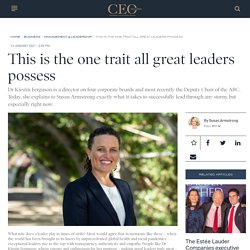
Most would agree that in moments like these – when the world has been brought to its knees by unprecedented global health and racial pandemics – exceptional leaders rise to the top with transparency, authenticity and empathy. People like Dr Kirstin Ferguson, whose energy and enthusiasm for her purpose – making good leaders truly great – knows no bounds, even in the precarious moment we are speaking. When we meet over Zoom, I’m immediately struck by her optimism and passion for her work and the future. A business leader, company director and leadership coach to some of Australia’s top executives, it’s no surprise she’s a much sought-after speaker and corporate advisor. “Every single one of us is a leader, regardless of what it says on our business card.” – Dr Kirstin Ferguson But that’s just a snapshot of her very impressive resume. How to Manage Your Former Peers. Becoming the boss is an exciting transition, but it can also be a nerve-wracking one.
This is especially true if you are now managing people who used to be your peers. You need to establish your credibility and authority, without acting like the promotion’s gone to your head. How you walk this line will depend on your organization and your leadership style, but here are some general rules to make any transition smoother. What the Experts Say “If you take a typical group of mid-level executives and ask if they’ve ever been promoted to lead their peers, 90% of them will say yes,” says Michael Watkins, the chairman of Genesis Advisers and author of The First 90 Days and Your Next Move. But being in good company doesn’t make it any easier. Signal the transition In most companies, it’s someone else’s responsibility to announce your promotion.
Tread lightly at first You probably have tons of ideas about how to lead the team. What to Do First When Managing Former Peers. You just learned that you’ve been promoted and will now be managing a team of your former peers — exciting news! That is, until the moment you realize that your good fortune means disappointment for your coworkers who didn’t get the job. When you’re promoted over people who have always been friends (or rivals), the power relationship is inevitably altered. 2021 Global Human Capital Trends.
Increasing Accountability Through Leadership. Have you ever griped about employees’ lack of initiative? Grumbled over their unwillingness to take ownership of projects, processes, and problems? Then just shook your head, thinking there is nothing you can do to boost accountability? The challenge for organizations is that accountability is intrinsic. What People (Still) Get Wrong About Emotional Intelligence. Many people assume that having emotional intelligence means being“nice.” But this perception obscures some fundamental benefits to developing one’s EI. For example, simply saying someone is nice can belie... In the 25 years since my book Emotional Intelligence was published, one of the most persistent things I see people get wrong about the concept is that it equates to being “nice.”
But it doesn’t, and misunderstanding this can get people into trouble. The first thing that often comes to mind when someone says a colleague is “nice” is that they’re pleasant to work with. On the flip side, especially in some competitive business contexts, I also see niceness interpreted as someone who tries to avoid confrontations and is thus easily manipulable. Leadership Run Amok: The Destructive Potential of Overachievers. A leader’s hunger to achieve—to continually be the best—is a major source of strength for any organization. It fuels innovation, productivity, and growth: companies would be lost without it. But taken to an extreme, the drive to achieve can damage an enterprise. Emotional Intelligence Has 12 Elements. Which Do You Need to Work On?
Although there are many models of emotional intelligence, they are often lumped together as “EQ” in the popular vernacular. Open, honest and effective: what makes Jacinda Ardern an authentic leader. The qualities that have made Jacinda Ardern New Zealand’s most popular prime minister in a century were on display this week as she took an earthquake in her stride during a live television interview. “We’re fine,” she declared cheerfully as the 5.9-magnitude quake shook New Zealand’s parliament house in Wellington for 15 seconds. Google spent 10 years researching what makes a great manager. They found these 10 things - Not-For-Profit People.
Research shows that managers matter. Psychological safety: an overlooked secret to organizational performance. Have you ever worked on a team with low psychological safety? Every New Employee Needs an Onboarding “Buddy” 3 Reasons Your Company Needs a Mentoring Program. Doing business today requires having low-cost, yet high-quality, solutions. Starting a mentoring program in your business allows you to capitalize on your greatest resource, your employees. Strategically developing their talent contributes to the company's growth, innovation, and bottom line. It shows management's support, interest, and concern for an employee's potential with the company. The psychological ingredients of high-performing teams - Work Life by Atlassian. What It Takes to Coach Your People. What Is Psychological Safety at Work? As research on diversity and inclusivity stacks up, most HR and senior executives agree: Organizations benefit from diversity of thought.
Groups made up of people with different life experiences bring together many valuable perspectives. Guide: Understand team effectiveness. Much of the work done at Google, and in many organizations, is done collaboratively by teams. The team is the molecular unit where real production happens, where innovative ideas are conceived and tested, and where employees experience most of their work. Guide: Identify what makes a great manager. Six tips for the difficult conversation with a remote employee who's underperforming - Not-For-Profit People. How to conduct an effective performance review remotely - Not-For-Profit People. Decision making during the coronavirus crisis. To weather a crisis, build a network of teams. Integrative awareness: Staying calm and optimistic in a crisis.
Cultivating compassionate leadership during Covid-19. The boss factor. Report Beyond Decision Bias. Thriving during a pandemic: What moves the needle on organizational health. Driving organizational and behavior changes during a pandemic. A model for effective change management. Winning hearts and minds in the 21st century. From supervisor to team leader - Discovery in Action. 7 killer questions that fundamentally shift a conversation - Discovery in Action. Circle of concern v Circle of control - Discovery in Action.
Influence model and shifting mindsets during COVID-19. Influence model and shifting mindsets during COVID-19. HR says talent is crucial for performance. Why capabilities are key in the postpandemic era. Addressing the 5 Sources of Employee Demotivation. The Genie Is out of the Bottle: How Leaders Can Adapt. What is leadership, and who is a leader? Leadership Skills Needed in the Future Uncertain World. AIM How Australian industry has responded to the COVID 19 pandemic Infographic. 3 Key Leadership Questions to Answer Now. 3 Ways Great Leaders Use Creativity to Engage Others. Mihaly Csikszentmihalyi: Flow, the secret to happiness. Developing Resilience - Bounce Back from Setbacks with MindTools.com.
Adapting to Change Requires These 3 Types of Flexbility. After COVID-19: An executive’s guide to operational recovery. Six Emotional Leadership Styles - Leadership Skills From MindTools.com. Emotional Intelligence Has 12 Elements. Which Do You Need to Work On? Louise Thomson LinkedIn Self leadership social leadership and Strategic leadership. (16) UNITING: Leading Others - A Focus on Coaching. (1) What opportunities will you seize to define your 'new normal' as a leader? (16) How do we determine and manage performance during times of crisis?
(16) Advice for leaders who may be struggling and now need to lead remotely. Top 25 Leadership & Management Blogs - Hubworks.